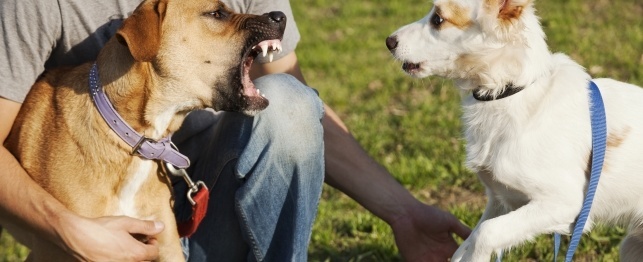The Dark Side of Dog Parks – Why Dog Parks May Not Be Your Dog’s Friend

Dogs
Dog parks have become increasingly popular because dog lovers like to give their dogs a good place to play and an opportunity to socialize with other dogs (and other owners). Dog parks give urban dogs without big yards a chance to really stretch their legs and run, and let out all that pent up energy. For their owners, it can be a great way to get out of the house and meet other dog lovers.
As you may know, exercise is very important to dogs. For that reason we are all for dog parks. But there are dangers of dog parks you need to know about.
Here are some of the dangers:
Dog bites. Not all dogs are "nice" and play well with others. Dog bites and attacks can happen. Just as not everyone likes every other person – even dogs with no history of aggression can bite and be bitten. It is not a bad idea to carry a first aid kit in your car for your dog. For instructions on how to build your own first aid kit, go to: Create a First Aid Kit that Could Save Your Dogs Life
Parasites. Fleas, ticks can live on dogs, fall into the grass or environment of the dog park and jump on your dog. If you take your dog to the dog park – a year-round flea control medication is recommended. For more information on flea control, go to: Flea Control and Prevention in Dogs
Worms. Dogs that have worms can shed their worms into the environment by having a bowel movement in the park. These worms can live in the grass and on the ground for days. When your dog innocently eats a blade of grass or later licks his fur or feet that have walked through the infestation – BOOM! – your dog can also have worms.
Parvovirus. This is a very infectious and dangerous disease of puppies. Most often unvaccinated puppies are vulnerable. A dog infected with "Parvo" can go to the park, have a bowel movement and this virus can live for months or years in the ground. Again – when your unvaccinated dog or cute new puppy goes to the park, he can pick it up by eating grass or by playing with a ball in the grass then grooming. To protect your dog, ensure that he has a full series of puppy vaccines (every 3 to 4 weeks from age 6 weeks to 16 weeks) and routine vaccines as an adult.
Kennel cough. Kennel cough is also known as Infectious Tracheobronchitis. It is called "kennel cough" because it is very contagious and has been associated with areas where there are a lot of dogs in a confined space. It is spread through the air. For most dogs, the signs are that of an annoying cold – with the primary sign being a bad cough. However, some dogs can develop a bacterial infection that can lead to pneumonia. There is a vaccine for kennel cough and if you routinely take your dog to the park this may be a good idea. Please discuss with your veterinarian.
Rabies. Catching rabies at the park is unlikely as rabies in dogs is uncommon. But it would be possible if your dog is unvaccinated and an infected dog bites him. Keep your dog vaccinated for rabies as required by law and maintain your dog's record.
These are the most common contagious problems that dogs can get from other dogs. These are not only possibilities at the dog park but also on any walk where there is interaction with other dogs or where other dogs have been – even in your own yard.
Please take care when you take your dog to the park. The best thing you can do to protect your dog is to ensure he has great wellness care. Talk to your veterinarian based on recommendations in your area. For more information on the best thing you can do to protect your dog, go to: PetCare Recommendations for Your Dog


 MORE Games That Delight Dogs
MORE Games That Delight Dogs
MORE Games That Delight Dogs
MORE Games That Delight Dogs
 Doggie Play Dates: Are They for Your Dog?
Doggie Play Dates: Are They for Your Dog?
Doggie Play Dates: Are They for Your Dog?
Doggie Play Dates: Are They for Your Dog?
 Dog Parks and Bites: What You Need to Know
Dog Parks and Bites: What You Need to Know
Dog Parks and Bites: What You Need to Know
Dog Parks and Bites: What You Need to Know
 Fun at the Park for You and Your Dog
Fun at the Park for You and Your Dog
Fun at the Park for You and Your Dog
Fun at the Park for You and Your Dog
 Dog Games - Try Puppy Push-Ups
Dog Games - Try Puppy Push-Ups
Dog Games - Try Puppy Push-Ups
Dog Games - Try Puppy Push-Ups